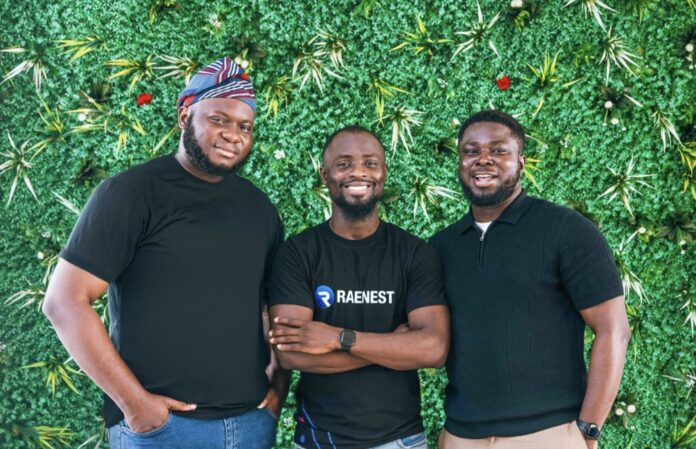As Africa’s tech ecosystem booms, more people from the region are landing remote jobs with big tech firms and global startups. But getting paid remains a challenge for many of these freelancers and remote workers — they struggle to open accounts that accept U.S. dollars, face slow invoicing and payment processes, and it doesn’t help when their foreign employers use incompatible payment platforms.
Lagos-based Raenest is one of the many African fintechs that have stepped in to address this problem. Through its retail product, Geegpay, Raenest offers freelancers virtual USD, GBP, and EUR accounts to receive payments, manage multi-currency wallets and convert currencies. It also provides virtual and physical debit cards that accept multiple currencies like U.S. dollars.
Last March, the company expanded its platform to cater to businesses to streamline international remittance with a new brand, Raenest for Business. Now, the startup has raised $11 million in Series A funding, led by QED Investors, to expand its reach across Africa.
Growth beyond freelancers
Interestingly, Raenest didn’t start with freelancers in mind. Victor Alade, along with co-founders Sodruldeen Mustapha and Richard Oyome, launched the company in 2022 as an Employer of Record (EOR), helping foreign companies pay African employees in compliance with local norms.
But a couple of months in, the founders realized the real problem didn’t lie with the companies sending payments — it was with individuals struggling to receive them.
“A U.S. company might not care if a payment is delayed by five days, but for someone in Nigeria or Kenya, that’s a big deal — especially when converting to local currency becomes another hurdle,” Alade, a former software engineer at Jumia and Andela, told TechCrunch.
Drawing from his remote work experience, Alade and his co-founders, who also bring experience working with African fintechs like LemFi and FairMoney, pivoted to address this pain point.
Geegpay quickly gained traction with freelancers, but business signups began to rise as well. The team realized that African companies also needed foreign accounts to streamline cross-border transactions. “Businesses started asking if they could get fixed bank accounts to simplify payments. That’s when we started thinking: How big is this opportunity? Who else is building for Africa?” Alade said.
Raenest’s addition of business banking couldn’t have come at a better time. Around this time, U.S.-based fintech Mercury started restricting business accounts from several countries, including parts of Africa. Meanwhile, competition in the EOR space was heating up, with major players like Deel starting to consider serving the continent more closely.
These events spurred Raenest to lean into what it saw as a better opportunity: Offering African businesses a way to receive and send international payments.
A viable gambit
The bet seems to be paying off. Since launching in 2022, Raenest has processed over $1 billion in payments — a 160% increase over the past two years — to freelancers and businesses across the continent. Today, more than 700,000 individuals use the platform to receive payments from global platforms like Upwork, Fiverr and Gusto. They also use it for online shopping and subscriptions.
On the enterprise side, over 300 companies rely on Raenest to collect payments from international customers, raise capital from investors, and make cross-border payments. Its client list includes startups like Moniepoint, Helium Health, Fez Delivery, and Matta.
Raenest competes with several fintech startups offering multi-currency accounts to customers in Africa, including Afriex, Cleva, Fincra, Grey, Verto and Leatherback. Alade argues that Raenest has an edge because it targets individuals and businesses, unlike most players that cater exclusively to one of those customer personas.
The company’s ambitions extend beyond cross-border payments. “We want to create a safe and seamless financial ecosystem for Africans — helping them earn, invest and grow their wealth, no matter where they are in the world,” Alade said, hinting at upcoming product launches.
Expansion plans
Currently, Raenest operates in Nigeria under a money transfer license. As part of its growth plans, the company will look to deepen its presence in Nigeria and secure licenses in Egypt, Ghana, Kenya and the U.S.
The company has banking partnerships in the U.S. and U.K., and it is also working to secure more in these regions as it scales. Along the way, the company aims to attract talent to support its expansion as it brings Geegpay and Raenest for Business under a single brand, Raenest.
The Series A round brings Raenest’s total funding to $14.3 million.
Lead investor QED, one of the world’s top fintech VC firms, has been steadily increasing its footprint in Africa since 2022. It has backed five fintech startups on the continent: Moniepoint, Remedial Health, Precium, Cedar Money, and now, Raenest.
“We firmly believe that by bridging the gap between local and global markets, Raenest will unlock new opportunities for African entrepreneurs, freelancers and businesses, ultimately driving greater economic empowerment across the continent,” said Gbenga Ajayi, partner and head of Africa and the Middle East at QED Investors.
Other investors in the round included pan-African VC firms Norrsken22, Ventures Platform, P1 Ventures and Seedstars.

